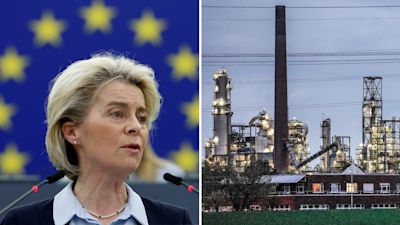Explainer
What could the future look like for Europe without Russian oil?

ITV News International Affairs Editor Rageh Omaar reports on the EU vowing to ease its dependency on Russian oil, with the bloc saying it is determined to make Putin pay a high price for his aggression
Words by ITV News Multimedia Producer Allegra GoodwinThe European Union has announced plans to ban Russian oil by the end of the year as part of a package of sanctions against Moscow for its war in Ukraine.
It follows decisions by the UK and the US to ban importing oil from Russia by the end of 2022.
Russia is the world's second largest oil exporter, so the EU is aiming to hit the country where it hurts with its proposal to stop paying $850 million (£678 million) a day for energy.
But since Russia invaded Ukraine, the market price of a barrel of oil has jumped from $80 (£64) to more than $100 (£80) amid fears about supply distribution.
Countries have been wrestling with the dilemma of how to stop Russian oil flows without driving prices so high the economy crashes.
Here's what the oil ban could mean for Europe:
How much does Europe pay Russia for oil?
The EU is Russia's top oil client, sending $450 million (£360 million) a day to Russia for oil, according to calculations by analysts at the Bruegel think tank in Brussels.
Critics have protested the fact Russian oil and gas have kept flowing, bolstering the Kremlin's budget while governments across Europe condemn Vladimir Putin's war.
The EU has given €35bn (£29.1bn) to Russia for energy supplies since the war started, and in comparison, just €1bn (£843 million) towards Ukraine's defence, according to top EU diplomat Josep Borrell, who has urged Europe to send more arms to Ukraine to help bring the war to an end.
How much Russian oil goes into Europe?
As the biggest purchaser of Russian crude oil, Europe received 138 million tons in 2020 out of Russia's total exports of 260 million tons - or 53%, according to the BP Statistical Review of World Energy.
Europe imports almost all of its crude oil, and a quarter of that comes from Russia.
Why are some landlocked countries against an oil ban?
Not all of the EU's 27 member states are happy to agree to a ban. Some countries, like Hungary and Slovakia, are landlocked and cannot import oil by sea into ports, so are highly dependent on Russia for energy supplies. They could look to be exempted from the EU's ban.
Slovakia is almost fully dependent on Russian oil it receives through the Soviet-era Druzhba pipeline.
Hungary is also heavily reliant, though Germany, another major energy importer, said it could cope if the EU banned Russian oil, with officials still noting that “it is a heavy load to bear".
For expert analysis and insight on the biggest stories listen to our podcast to find out What You Need To Know
What could a future without Russian oil supplies look like?
Europe could replace the 3.8 million barrels a day it imported from Russia before the war with barrels from suppliers in the Middle East, whose exports mostly go to Asia.
Meanwhile, shipments of Russian oil could go to Asia for discounted prices.
Several large refineries in central and Eastern Europe which rely on oil from a Soviet-era pipeline would have to find new ways of getting oil to make petrol.
European countries should be ready to impose measures to reduce fuel use, such as making public transport free and incentivising car-sharing, Bruegel analysts say.
If those measures don't work, tougher ones such as odd-even driving bans based on licence plate numbers would be needed.
Russia would probably produce and export less oil after losing its biggest customer. Rystad Energy expects a loss of 1.5 million to 2 million barrels per day.
Russia is a major supplier of Europe’s diesel fuel for trucks and farm equipment, meaning its price will affect those for a wide range of food and goods.
What could happen to oil prices?
It is likely that oil prices would rise for everyone, meaning higher prices at the petrol pump, and higher bills to heat your home - Rystad Energy expects oil prices to reach $120 (£96) to $130 (£104) per barrel by the end of the year.
This will intensify the painful squeeze on living standards in countries like the UK, which consumes far more oil than it produces.
It could also see consumers with less disposable income, and set back the world's economic recovery from the Covid pandemic.
A milder scenario, in which most Russian oil shunned by Europe is snapped up in other energy-hungry countries not taking part in the sanctions, would see a loss of 1 million barrels per day. Oil prices would drop below $100 (£80) by June and keep falling to $60 (£48) by the year's end.
Why is Europe focussing on oil instead of natural gas?
The EU has started discussions on a possible natural gas embargo, but agreement among member countries on targeting the fuel used to generate electricity and heat homes is more difficult to secure.
It's harder to find alternative sources of natural gas because it mainly comes by pipeline, whereas oil is mostly moved by tanker and is traded globally.
Heavy users of natural gas like Germany say an immediate boycott on Russian gas would cost jobs, while industrial associations have warned of shutdowns in glass and metals businesses.
There are also fears that an oil boycott might provoke Russia to cut off gas supplies in retaliation.